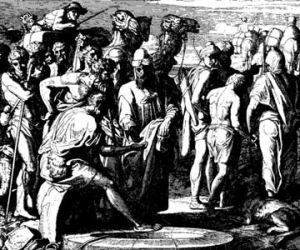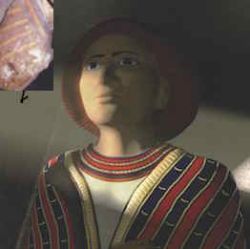Joseph

Joseph
Joseph's story is told in Genesis 37–50. He was the most beloved of Jacob's sons because he was the first born of Rachel.
His brothers were envious and hated. As they allowed themselves to become angry and jealous of Jacob's gift to Joseph, including a “coat of many colors” they would plot against him. The brothers eventual seized him and sold him to a party of Ishmaelites, or Midianites, who carried him to Egypt as a slave.
Joseph was blessed because he remained faithful to the ways of his fathers. He was spared and given great power.[1]

Joseph the vizier and would initiate all the people of Egypt including the sons of Jacob into a corvee system of civil bondage except the priests. The name given to Joseph has been said to mean ‘He who is called Ipiankhu’.
Ipiankhu can mean the "vizier".[2]. In Genesis 41:38 Pharaoh said Joseph had the "Spirit of God" who is the spirit of life.
The Ankh at the end of his name meant the key of life or the key of the Nile.
As an Egyptian vizier he may been, as some suspect, a Sekhemhet.
Joseph's[3] name Zaphenath when transformed into Egyptian the name has been matched with the word Sekhemhet.
Why Sekhem(k)het?
Sekhem(k)het can mean "grey or (red)[4] haired ruler over all".
Many associate Joseph with the name Imhotep. There were many who were called by Imhotep, a name that means The name given to Joseph has been said to mean ‘He who is called Ipiankhu’.
In Genesis 41:38 Pharaoh said Joseph had the "Spirit of God" who is the spirit of life.
Pharaoh saw that spirit of the life giver in Joseph and gave him a name that expressed that idea. The Ankh in Egypt is also known as the key of life or the key of the Nile.
As an Egyptian vizier he may been, as some suspect, a Sekhemhet.
Joseph's[3] name Zaphenath when transformed into Egyptian the name has been matched with the word Sekhemhet.
The sekhem scepter is a type of ritual scepter in ancient Egypt which was used as a symbol of authority Why Sekhem(k)het?
[4]
Many associate Joseph with the name Imhotep. There were many who were called by Imhotep, a name that means “the One Who Comes in Peace.”
Eventually a Pharaoh who did not know Joseph may this system rigorous.
Footnotes
Jacob and his sons
Joseph |
Reuben |
Simeon |
Judah |
Zebulun |
Issachar |
Dan |
Gad |
Asher |
Naphtali |
Benjamin |
Ephraim |
Manasseh |
- ↑ “God causes everything to work together for the good of those who love him” Romans 8:28.
- ↑ Ipiankhu (ipi) of "life"(ank) of "Hu"(h), "the personification of the creator of life".
- ↑ Jump up to: 3.0 3.1 03130 יוֹסֵף Yowceph yo-safe’ future of 03254 YodSamechPei yacaph to add, Greek 2501 Ιωσηφ; n pr m; [BDB-415b] {See TWOT on 874 @@ "874b" }
AV-Joseph 213; 213 Joseph= "Jehovah has added"
- 1) the eldest son of Jacob by Rachel
- 2) father of Igal, who represented the tribe of Issachar among the spies
- 3) a son of Asaph
- 4) a man who took a foreign wife in the time of Ezra
- 5) a priest of the family of Shebaniah in the time of Nehemiah
- ↑ Jump up to: 4.0 4.1 Sekhem(k)het can mean "grey or (red) haired ruler over all". A "crested ibis 𓅜" in a name can turn gray hair to red. There was more than one Pharaoh or ruler with red hair including a Ramesee.